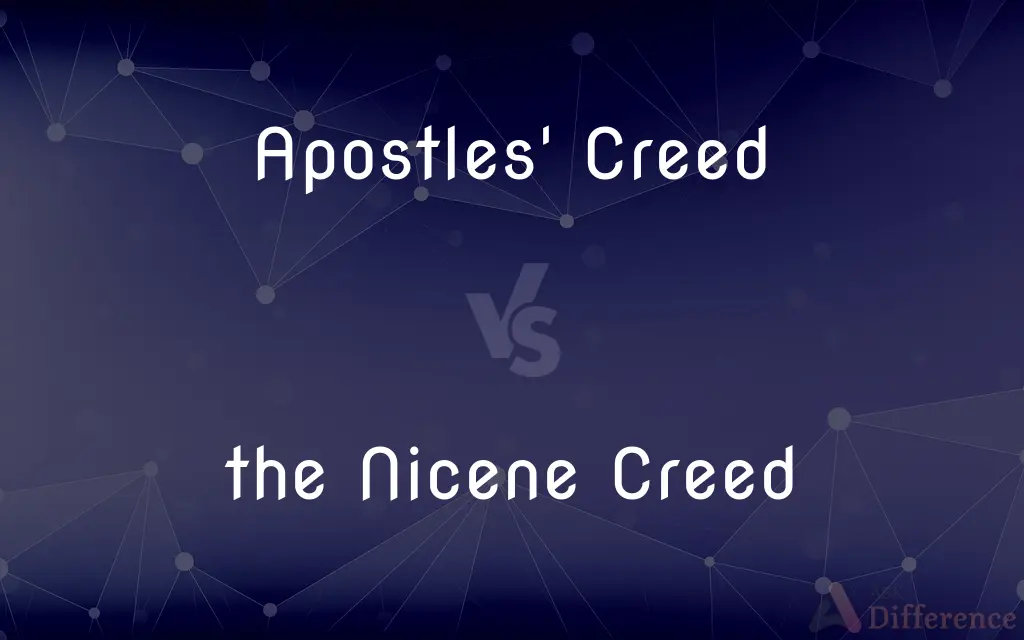Apostles' Creed vs. the Nicene Creed — What's the Difference?
Edited by Tayyaba Rehman — By Urooj Arif — Published on March 7, 2024
The Apostles' Creed is an early statement of Christian faith that is simpler and used in baptismal rites, while the Nicene Creed is more detailed, addressing theological controversies, especially concerning the nature of Christ and the Holy Trinity.

Difference Between Apostles' Creed and the Nicene Creed
Table of Contents
ADVERTISEMENT
Key Differences
The Apostles' Creed is one of the earliest creeds in Christianity, traditionally used in Western Christian denominations for baptism. It is concise, summarizing fundamental Christian beliefs about God the Father, Jesus Christ, and the Holy Spirit, without delving deeply into complex theological issues. Its simplicity and use in baptismal rites underscore its role as a basic statement of faith for Christians.
The Nicene Creed, on the other hand, was formulated at the Council of Nicaea in 325 AD and later expanded at the Council of Constantinople in 381 AD. It was specifically created to address and condemn the Arian controversy, which questioned the divinity of Jesus Christ. The Nicene Creed is more explicit about the nature of the Trinity and the relationship between the Father, the Son, and the Holy Spirit, reflecting its purpose to define orthodox Christian belief against heretical views.
Both creeds serve as foundational statements of Christian doctrine, but they are used differently within the liturgy and theology of the Church. The Apostles' Creed is often recited in daily worship services and is particularly associated with the rites of baptism in many Western churches. The Nicene Creed, being more detailed, is typically recited in the Eucharistic service (the Mass or Holy Communion) within both Eastern Orthodox and Western Christian traditions.
The Apostles' Creed's origin is associated with the apostles themselves, though it was not written by them. It is said to be a faithful summary of the apostles' teachings, hence its name. The Nicene Creed's development was a communal effort by Church leaders to clarify and establish essential Christian doctrine during a significant period of doctrinal controversy.
Despite their differences, both creeds emphasize the Christian belief in the Trinity, the resurrection, and the life everlasting. They have been pivotal in shaping Christian identity and doctrine throughout history, serving as a common foundation for faith among diverse Christian traditions.
ADVERTISEMENT
Comparison Chart
Origin
Early Christian Era
Council of Nicaea, 325 AD; revised at the Council of Constantinople, 381 AD
Purpose
Basic statement of Christian faith, used in baptism
Address theological controversies, specifically Arianism
Content
Simpler, focuses on foundational Christian beliefs
More detailed, especially on the nature of Christ and the Trinity
Use in Liturgy
Baptismal rites and daily worship services
Eucharistic service (Mass or Holy Communion)
Theological Focus
General beliefs about God, Jesus, and the Holy Spirit
Detailed exposition of the Trinity and the nature of Jesus' divinity
Compare with Definitions
Apostles' Creed
Emphasizes basic Christian beliefs.
The Apostles’ Creed is recited during baptism to profess the faith.
the Nicene Creed
Focuses on the divinity of Jesus Christ.
It was formulated to counter Arianism, which denied Christ's true divinity.
Apostles' Creed
Used in Western Christianity.
The Apostles’ Creed is commonly used in Protestant and Roman Catholic churches.
the Nicene Creed
Developed to address early Church controversies.
The Nicene Creed explicitly states that Jesus Christ is of one being with the Father.
Apostles' Creed
Focuses on the foundational aspects of Christianity.
The Creed mentions belief in the Holy Spirit and the holy catholic Church.
the Nicene Creed
More detailed theological statement.
The Creed provides a detailed description of the nature of the Trinity.
Apostles' Creed
A brief statement of Christian faith for baptismal use.
The Apostles’ Creed begins with I believe in God, the Father Almighty.
the Nicene Creed
Used in both Eastern Orthodox and Western Christian liturgy.
The Nicene Creed is recited during the Eucharistic service.
Apostles' Creed
Associated with the teachings of the apostles.
The Apostles’ Creed is considered a summary of the apostles' teachings.
the Nicene Creed
Revised at the Council of Constantinople.
The addition of clauses on the Holy Spirit was made in 381 AD.
Common Curiosities
What was the main purpose of the Nicene Creed?
To address and resolve theological controversies about the nature of Christ and the Trinity.
Why was the Apostles’ Creed created?
To provide a simple statement of Christian faith, especially for use in baptism.
Is the Nicene Creed recited in Protestant churches?
Yes, many Protestant denominations recite the Nicene Creed, especially during communion services.
Are both creeds accepted by all Christian denominations?
Most Christian denominations accept both creeds, though their use varies in worship services.
Who composed the Apostles’ Creed?
It was not written by the apostles but is a summary of apostolic teaching.
Why is the Nicene Creed more detailed than the Apostles’ Creed?
Because it was developed to specifically address and clarify complex theological issues.
Why is the Nicene Creed important in Christianity?
It defines orthodox Christian beliefs about the Trinity and Christ’s nature, uniting different Christian traditions.
How do the creeds reflect early Christian beliefs?
They encapsulate core Christian doctrines as understood by the early Church.
Was the Nicene Creed accepted immediately?
Its acceptance evolved over time, especially after being revised in 381 AD to include a fuller description of the Holy Spirit.
Can the Apostles’ Creed and the Nicene Creed be used interchangeably?
While both profess the Christian faith, their use in liturgy and the specific doctrines they emphasize differ.
How do the creeds serve modern Christianity?
They continue to provide a foundational summary of Christian beliefs for worship and instruction.
What was the Arian controversy?
A theological dispute in the early Church about whether Jesus Christ was divine in the same way as God the Father.
What role does baptism play in the Apostles’ Creed?
The Creed is particularly associated with the profession of faith made at baptism.
How does the Nicene Creed influence ecumenical dialogue?
It serves as a common doctrinal basis for discussions among different Christian denominations.
What does "catholic" mean in the Apostles’ Creed?
It means "universal," referring to the whole Christian Church.
Share Your Discovery

Previous Comparison
Walleye vs. Saugeye
Next Comparison
Eufy Doorbell vs. Ring DoorbellAuthor Spotlight
Written by
Urooj ArifUrooj is a skilled content writer at Ask Difference, known for her exceptional ability to simplify complex topics into engaging and informative content. With a passion for research and a flair for clear, concise writing, she consistently delivers articles that resonate with our diverse audience.
Edited by
Tayyaba RehmanTayyaba Rehman is a distinguished writer, currently serving as a primary contributor to askdifference.com. As a researcher in semantics and etymology, Tayyaba's passion for the complexity of languages and their distinctions has found a perfect home on the platform. Tayyaba delves into the intricacies of language, distinguishing between commonly confused words and phrases, thereby providing clarity for readers worldwide.
















































